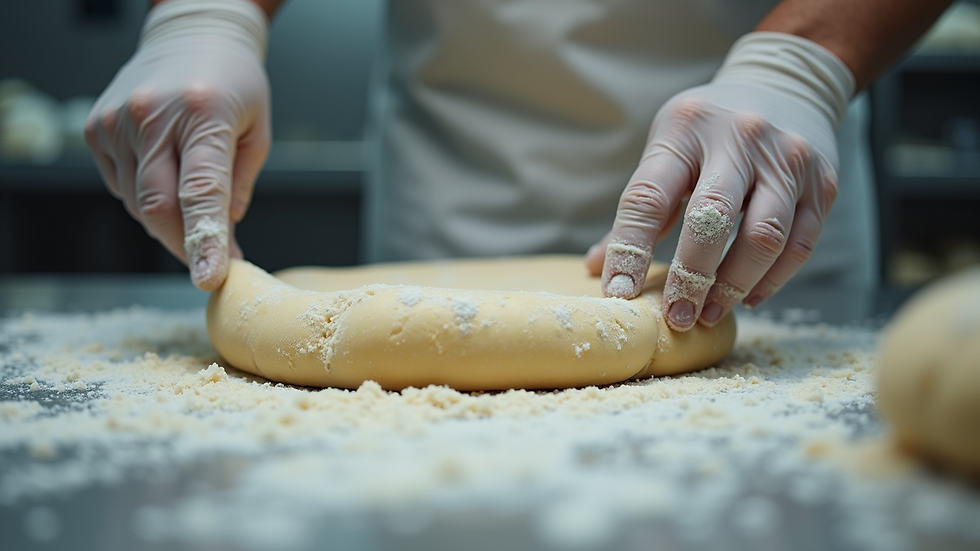Skilled Mechanics Solving Industrial Bakery Issues
- Drew Calvin
- Jul 9
- 5 min read
In the world of industrial bakeries, efficiency is key. Every minute counts when producing delicious bread, pastries, and cakes. However, machinery can break down, leading to costly delays. This is where skilled mechanics come into play. They are the unsung heroes who keep the wheels of the bakery turning.
In this blog post, we will explore the vital role of mechanics in industrial bakeries. We will discuss common issues they face, how they solve these problems, and the importance of regular maintenance. By the end, you will understand why having skilled mechanics is essential for any bakery operation.
The Importance of Skilled Mechanics
Skilled mechanics are crucial in any industrial setting, especially in bakeries. They ensure that all machinery operates smoothly. This includes ovens, mixers, and conveyor belts. When these machines work well, production runs efficiently.
However, when something goes wrong, it can halt production. A broken mixer or a malfunctioning oven can lead to wasted ingredients and time. This is why having a skilled mechanic on hand is invaluable. They can quickly diagnose and fix issues, minimizing downtime.
Common Issues in Industrial Bakeries
Industrial bakeries face a variety of mechanical issues. Here are some of the most common problems:
Oven Malfunctions: Ovens are the heart of any bakery. If they do not heat properly, baked goods can be undercooked or burnt.
Mixer Breakdowns: Mixers are essential for dough preparation. If a mixer fails, it can delay the entire production process.
Conveyor Belt Problems: Conveyor belts transport products through the bakery. If they stop working, it can create a bottleneck in production.
Cooling System Failures: Proper cooling is necessary for many baked goods. A malfunctioning cooling system can spoil products.
Electrical Issues: Many bakery machines rely on electricity. Electrical problems can lead to equipment failure and safety hazards.
Each of these issues requires a skilled mechanic to address them quickly and effectively.
How Mechanics Solve Bakery Problems
When a problem arises, mechanics follow a systematic approach to find a solution. Here are the steps they typically take:
Diagnosis: The first step is to identify the problem. Mechanics use their experience and knowledge to determine what is wrong. They may listen to the machine, check for error codes, or inspect components.
Repair: Once the issue is identified, mechanics will repair or replace the faulty parts. This may involve tightening bolts, replacing belts, or fixing electrical connections.
Testing: After repairs, mechanics test the machinery to ensure it is working correctly. They may run the machine for a short period to check for any lingering issues.
Maintenance: To prevent future problems, mechanics often perform routine maintenance. This includes cleaning, lubricating, and inspecting machines regularly.
By following these steps, skilled mechanics can quickly resolve issues and keep production on track.
The Role of Preventive Maintenance
Preventive maintenance is a proactive approach to keeping bakery machinery in good condition. It involves regular checks and servicing to prevent breakdowns. Here are some benefits of preventive maintenance:
Reduced Downtime: Regular maintenance helps identify potential issues before they become serious problems. This means less downtime for repairs.
Cost Savings: Preventive maintenance can save money in the long run. It is often cheaper to maintain equipment than to repair it after a breakdown.
Increased Lifespan: Well-maintained machines last longer. This means fewer replacements and lower overall costs.
Improved Safety: Regular checks can identify safety hazards, reducing the risk of accidents in the workplace.
Bakeries that invest in preventive maintenance often see significant improvements in efficiency and productivity.
Real-Life Examples of Mechanic Interventions
To illustrate the importance of skilled mechanics, let’s look at a few real-life examples of how they have solved bakery issues.
Example 1: The Oven Breakdown
A large bakery faced a crisis when one of its main ovens stopped heating. This oven was responsible for baking a significant portion of their products. The mechanic quickly diagnosed the issue as a faulty heating element.
After replacing the element, the mechanic tested the oven to ensure it was functioning correctly. Production resumed within a few hours, saving the bakery from a potential loss of revenue.
Example 2: Mixer Malfunction
In another instance, a bakery's mixer began making strange noises and vibrating excessively. The mechanic discovered that a bearing had worn out.
By replacing the bearing and lubricating the mixer, the mechanic restored it to full working order. This quick fix allowed the bakery to continue producing dough without significant delays.
Example 3: Conveyor Belt Jam
A bakery experienced a jam in its conveyor belt system, causing a backlog of products. The mechanic quickly identified a misaligned belt as the cause.
After realigning the belt and ensuring all components were secure, the mechanic tested the system. The conveyor belt was back in action, and production resumed smoothly.
These examples highlight the critical role mechanics play in maintaining bakery operations. Their expertise can make a significant difference in productivity and efficiency.
The Future of Bakery Mechanics
As technology advances, the role of mechanics in bakeries is evolving. Many bakeries are now using automated systems and smart technology. This can improve efficiency but also requires specialized knowledge to maintain.
Skilled mechanics will need to adapt to these changes. They will need to learn about new technologies and how to troubleshoot them. Continuous training and education will be essential for mechanics to stay relevant in the industry.
Embracing Technology
Bakeries are increasingly adopting technology to streamline operations. This includes:
Automated Mixing Systems: These systems can mix dough with precision, reducing human error.
Smart Ovens: Ovens that can be controlled remotely and provide real-time data on baking conditions.
Inventory Management Software: This helps bakeries track ingredients and manage stock levels efficiently.
While technology can enhance productivity, it also presents new challenges. Mechanics must be equipped to handle these advanced systems.
Building a Strong Mechanic Team
To ensure smooth operations, bakeries should focus on building a strong team of mechanics. Here are some tips for creating an effective mechanic team:
Invest in Training: Provide ongoing training for mechanics to keep their skills up to date. This can include workshops, online courses, and certifications.
Encourage Teamwork: Foster a collaborative environment where mechanics can share knowledge and support each other.
Prioritize Communication: Ensure that mechanics communicate effectively with other staff members. This helps in quickly identifying and addressing issues.
Recognize Achievements: Celebrate the successes of your mechanics. Recognizing their hard work can boost morale and motivation.
By investing in their mechanics, bakeries can create a reliable team that keeps operations running smoothly.
The Bottom Line
In the fast-paced world of industrial bakeries, skilled mechanics are essential. They solve problems quickly, perform maintenance, and ensure that production runs smoothly. By understanding the common issues they face and the solutions they provide, bakeries can appreciate the value of having a dedicated mechanic team.
As technology continues to evolve, the role of mechanics will also change. Embracing new tools and techniques will be crucial for staying competitive.
Ultimately, investing in skilled mechanics is an investment in the bakery's future. With their expertise, bakeries can continue to produce high-quality products efficiently and effectively.









Comments